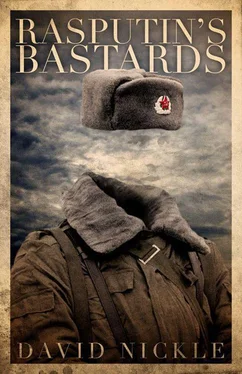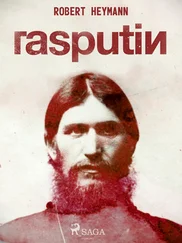What a place, thought Alexei, a metaphor of the lie of his childhood, embedded within another metaphor that was the truth of it. Or he supposed it to be the truth. Alexei began to wonder just what the nature of truth might be in this place. He ran his thumb across the wood-grain of his desk. Could not, he wondered, any recollection be constructed with detail as convincing — so that he could not be certain, truly, of anything in his past? Could not the recollection — now distant — of Holden Gibson and the boat and Heather; of Mrs. Kontos-Wu and the Romanians; of New York City, the world itself, his own name, his own identity — all of it — couldn’t it all be a fabrication, just as cunningly wrought as this desk? If that too were a fabrication… if the firmament of his life truly were a lie — then what good was anything?
The direction of his thoughts made Alexei queasy. Trying to talk it out, he recalled, had led to a metaphorical rock in his metaphorical head from the little bastard Ivan. So rather than seeking some equilibrium in further dialogue, he stood up and asked if he might be excused.
“Bladder too small, Kilodovich?” asked Czernochov mildly.
“I’m not feeling well,” said Alexei. “Think I’m going to sick up.” He put his fingers to his lips and inflated his cheeks like they were filling up with bile.
“Well then. Better go deal with it.” Czernochov sneered as he spoke it. Several of his metaphorical classmates snickered. Alexei got up and made his way to the door. The hallway was still a work in progress — if he squinted, he could see through walls as though they were simple strips of canvas, into washrooms and meeting rooms, and, as he passed it, the great void of the gymnasium. He went straight to the north doors, pushed them open, and stepped outside into the freezing cold of the afternoon.
The sky was perfect blue today. Maybe, thought Alexei bitterly, by tomorrow Kolyokov would have thought to add some attractive cloud. He’d obviously spent his time up to now on the snow and the rock. Alexei trudged across it, his freezing hands jammed into the pockets of his trousers.
When he was far enough away from the building, Alexei shouted, “You are a bastard fuck, Comrade Kolyokov!”
The wind howled in answer. Fyodor Kolyokov did not appear. Alexei found himself suddenly hoping that he might.
Not, of course, the Kolyokov who was probably now playing Party politics with Comrade General Rodionov — trying to secure the survival of his precious City 512. Not him — but the ghost Kolyokov who’d appeared to Alexei what seemed like months ago: a geriatric specter in wind-blown snow; aged and ominous and fleeting. That one, Alexei decided, was the real man — the Fyodor Kolyokov who drew his rage; this one, here in memory, hadn’t yet begun to exact the indignities upon him that had led him into this terrible spiral of memory — this unhinging of truth.
Alexei came to the very back of the exercise yard. Here, the snow was not nearly so distinct — it clotted on his heels like half-frozen cream. The air was cold, but it was more an idea of cold than the thing itself: a Platonic chill.
And so it was with the fence. Eventually, the fence would be eight feet high and capped with razor-wire. Now, it was a flat, vertical plane, etched with just the blurry indication of chain link. Alexei reached out to touch it. It felt like metal, but was yielding like a skin of rubber. Alexei pulled at it until he’d made a space wide enough to step through.
“Bastard fuck,” he said, looking back at the low buildings, the icy fields — all of it, the evil and manipulative lie of his childhood. Then he turned from it, and bending only slightly, stepped through the fence.
The last time Stephen had seen sky was the dawn outside Silifke, just a day ago. It had been something: fluted streamers of cloud pasted against a slate of a sky that ran tones between purple and orange and deep, deep blue. A contrail of some high-flying jet transected it like a filament of gold. There were smells, too — the faintly sweet, faintly corrupt odour of the port, mingled with turpentine-fresh gasoline from the inboard motor of the fishing boat that was taking them out the mouth of the Goksu River to the Mediterranean Sea.
Eyes shut and fists clenched in the tiny midshipman’s cabin they’d given him, Stephen tried to summon that sky. It might just banish the sweating metal pipes and red-painted valves that hovered just three feet over his hard, narrow bunk. But seeing sky through the roof of a submarine was more difficult than discovering Central Park behind Manhattan water towers from the 14th floor of the Emissary. They had been running deep since the fishing boat had unloaded them on the sub’s deck. And the distractions in this place — the thrumming of the engines; the stink of the engines; and the clattering of footsteps and hatches and the occasional words of spoken conversation — made Stephen’s carefully studied exercises all but useless.
If, that was, Zhanna hadn’t been right — and those exercises hadn’t been useless from the beginning.
Stephen opened his eyes and rolled off the bunk. There was just enough room for him to stand up. If he turned to the left a little, there was a little table. If he turned to the right a little, there was the hatch to the submarine’s spinal corridor. If he took one step in any direction, he’d bash his head on a valve or a pipe or one of the dozens of little lozenge-shaped light fixtures that buzzed and clicked through the day.
Stephen cleared his throat.
“Shh!”
A red-fingered, bandaged hand shot out from the bottom bunk. Uzimeri glared up at Stephen. He clasped his hands together as in prayer and rested his head on them, and mouthed: Sleeping .
Fuck off , mouthed Stephen. But he kept quiet. Glancing out into the corridor, he saw that the lights had indeed been turned down. Most of the submarine’s cargo was asleep — and that meant that those who were awake had to keep quiet, because a sudden loud noise to wake one or two of them could spell disaster.
The first time the crew went to sleep, it very nearly did. Uzimeri was in a tiny galley no bigger than a men’s room stall, boiling water for a porridge, and Mrs. Kontos-Wu, Stephen, and two other guests — a thirtyish red-haired woman and a round little man with a thumbprint-sized mole on his cheek — were settled in the cramped mess hall. They’d been in the submarine just a few hours.
Mrs. Kontos-Wu had tried to convince Uzimeri to take it easy — he’d been damn near dead when they’d found him, after all.
“Stephen can cook,” said Mrs. Kontos-Wu, taking Uzimeri’s stick-thin arm and guiding him to a seat.
But Uzimeri had refused.
“I am restored,” he said. “I am back amongst my people now. Let me feed you this simple breakfast, yes?”
Mrs. Kontos-Wu gave up after that — and Stephen was less worried about making sure Uzimeri was steady on his feet than he was about Mrs. Kontos-Wu’s own interior stability.
After all — she’d seemed fine back in the Emissary, when she’d basically given them up to the mob. She seemed fine now, too. But like a junkie, she could be back into her never-never land of metaphor in a second. Stephen didn’t take his eyes off her as she conversed with the two Russians.
“I am Ilyich,” said the man, in Russian. “This is Tanya.”
“We have been on board since Odessa,” said Tanya. “How was Silifke? Did you happen to visit the Tekir Ambar?”
“The — ?” Mrs. Kontos-Wu frowned, her lips turned up in a question.
“No,” said Tanya. “You would know what that was if you had seen it. It is a great cistern, next to Silifke Castle. There are stairs climbing down the side of it. You can walk to the bottom. It was made by Romans. You can feel their presence in the stones. Ghosts.” Tanya beamed. “Silifke is a wonderful town. The Romans, the Christians — everyone had a hand there. And the people — so friendly!”
Читать дальше












